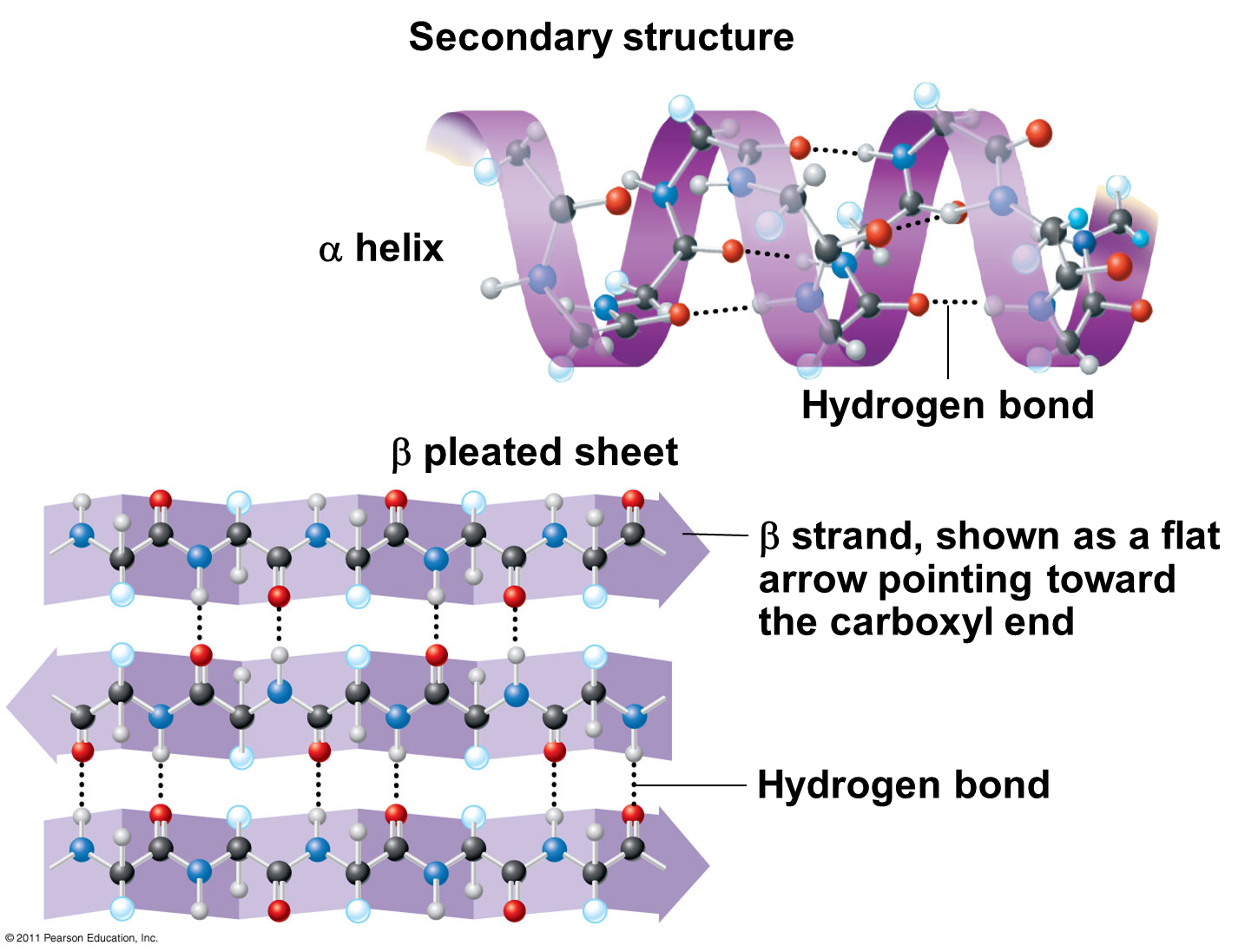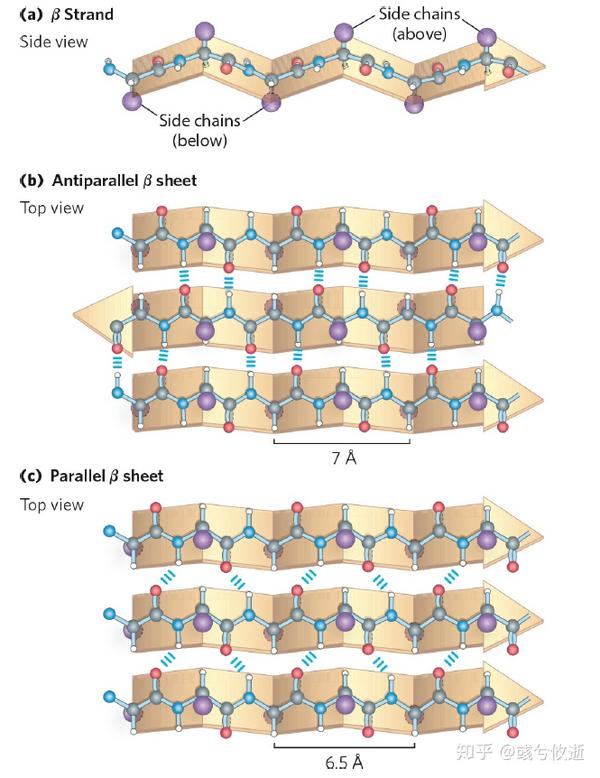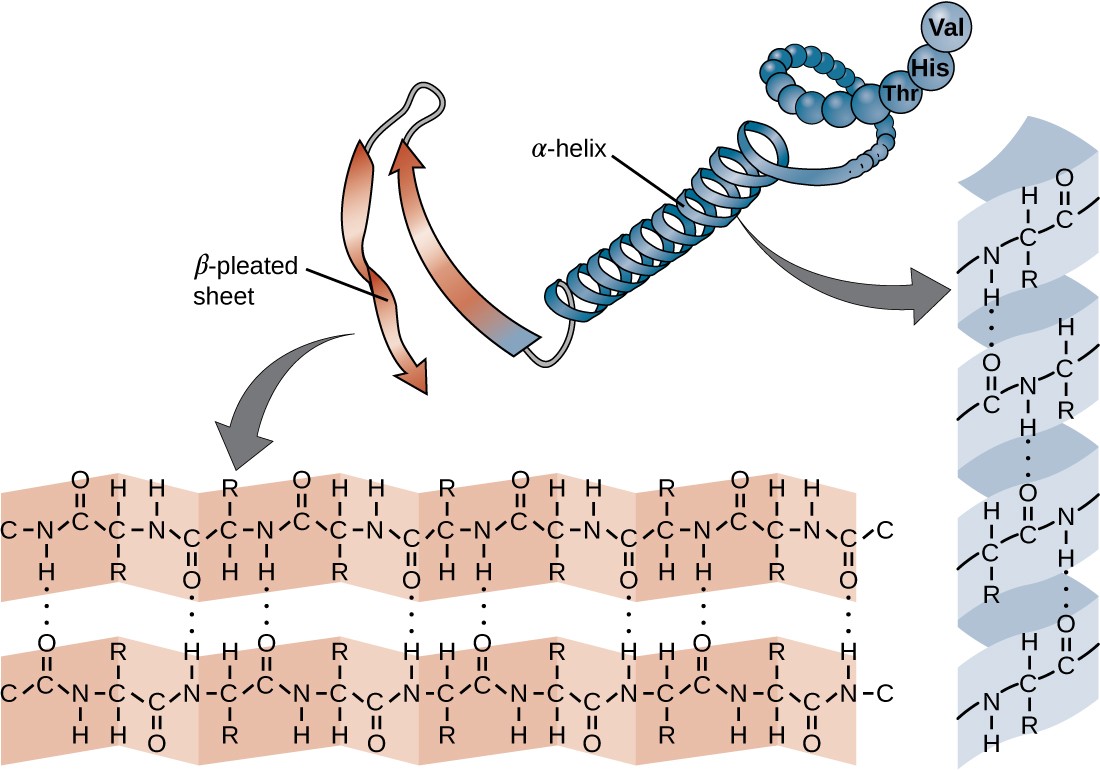Secondary Structure Of Protein Beta Sheet
Secondary Structure Of Protein Beta Sheet - [1] the two most common secondary structural elements are alpha helices and beta. Web the secondary structure is formed by hydrogen bonds between carbonyl and amino groups that make up the polypeptide backbone and causes the molecule to either bend and fold (beta pleated sheet) or spiral. The other portions of the polymer backbone that are regular but not repetitive are called. Web protein secondary structure is the local spatial conformation of the polypeptide backbone excluding the side chains. This structure occurs when two (or more, e.g.
Web protein secondary structure is the local spatial conformation of the polypeptide backbone excluding the side chains. The other portions of the polymer backbone that are regular but not repetitive are called. This structure occurs when two (or more, e.g. [1] the two most common secondary structural elements are alpha helices and beta. Web the secondary structure is formed by hydrogen bonds between carbonyl and amino groups that make up the polypeptide backbone and causes the molecule to either bend and fold (beta pleated sheet) or spiral.
The other portions of the polymer backbone that are regular but not repetitive are called. Web protein secondary structure is the local spatial conformation of the polypeptide backbone excluding the side chains. Web the secondary structure is formed by hydrogen bonds between carbonyl and amino groups that make up the polypeptide backbone and causes the molecule to either bend and fold (beta pleated sheet) or spiral. [1] the two most common secondary structural elements are alpha helices and beta. This structure occurs when two (or more, e.g.
Amino Acids 8. The betapleated sheets secondary structure of Proteins
Web protein secondary structure is the local spatial conformation of the polypeptide backbone excluding the side chains. This structure occurs when two (or more, e.g. The other portions of the polymer backbone that are regular but not repetitive are called. Web the secondary structure is formed by hydrogen bonds between carbonyl and amino groups that make up the polypeptide backbone.
Seven Days per Week STPM Biology Biological Molecules (Part 15)
Web the secondary structure is formed by hydrogen bonds between carbonyl and amino groups that make up the polypeptide backbone and causes the molecule to either bend and fold (beta pleated sheet) or spiral. The other portions of the polymer backbone that are regular but not repetitive are called. This structure occurs when two (or more, e.g. Web protein secondary.
The BioLogs CAPE 1 Proteins
This structure occurs when two (or more, e.g. Web the secondary structure is formed by hydrogen bonds between carbonyl and amino groups that make up the polypeptide backbone and causes the molecule to either bend and fold (beta pleated sheet) or spiral. [1] the two most common secondary structural elements are alpha helices and beta. Web protein secondary structure is.
Beta pleated sheet Secondary structure of protein YouTube
Web protein secondary structure is the local spatial conformation of the polypeptide backbone excluding the side chains. Web the secondary structure is formed by hydrogen bonds between carbonyl and amino groups that make up the polypeptide backbone and causes the molecule to either bend and fold (beta pleated sheet) or spiral. This structure occurs when two (or more, e.g. [1].
1. Secondary structure of protein, αhelix and βpleated sheet [118
Web protein secondary structure is the local spatial conformation of the polypeptide backbone excluding the side chains. The other portions of the polymer backbone that are regular but not repetitive are called. Web the secondary structure is formed by hydrogen bonds between carbonyl and amino groups that make up the polypeptide backbone and causes the molecule to either bend and.
4.2 Protein Secondary Structure 知乎
This structure occurs when two (or more, e.g. Web the secondary structure is formed by hydrogen bonds between carbonyl and amino groups that make up the polypeptide backbone and causes the molecule to either bend and fold (beta pleated sheet) or spiral. [1] the two most common secondary structural elements are alpha helices and beta. The other portions of the.
parallel beta sheet Cheaper Than Retail Price> Buy Clothing
Web the secondary structure is formed by hydrogen bonds between carbonyl and amino groups that make up the polypeptide backbone and causes the molecule to either bend and fold (beta pleated sheet) or spiral. [1] the two most common secondary structural elements are alpha helices and beta. Web protein secondary structure is the local spatial conformation of the polypeptide backbone.
PPT Protein Structure and Prediction PowerPoint Presentation, free
Web protein secondary structure is the local spatial conformation of the polypeptide backbone excluding the side chains. [1] the two most common secondary structural elements are alpha helices and beta. Web the secondary structure is formed by hydrogen bonds between carbonyl and amino groups that make up the polypeptide backbone and causes the molecule to either bend and fold (beta.
Secondary structures of keratin protein (beta pleated sheets and alpha
The other portions of the polymer backbone that are regular but not repetitive are called. [1] the two most common secondary structural elements are alpha helices and beta. This structure occurs when two (or more, e.g. Web the secondary structure is formed by hydrogen bonds between carbonyl and amino groups that make up the polypeptide backbone and causes the molecule.
7.4 Proteins Microbiology 201
The other portions of the polymer backbone that are regular but not repetitive are called. [1] the two most common secondary structural elements are alpha helices and beta. This structure occurs when two (or more, e.g. Web the secondary structure is formed by hydrogen bonds between carbonyl and amino groups that make up the polypeptide backbone and causes the molecule.
The Other Portions Of The Polymer Backbone That Are Regular But Not Repetitive Are Called.
Web the secondary structure is formed by hydrogen bonds between carbonyl and amino groups that make up the polypeptide backbone and causes the molecule to either bend and fold (beta pleated sheet) or spiral. [1] the two most common secondary structural elements are alpha helices and beta. This structure occurs when two (or more, e.g. Web protein secondary structure is the local spatial conformation of the polypeptide backbone excluding the side chains.









